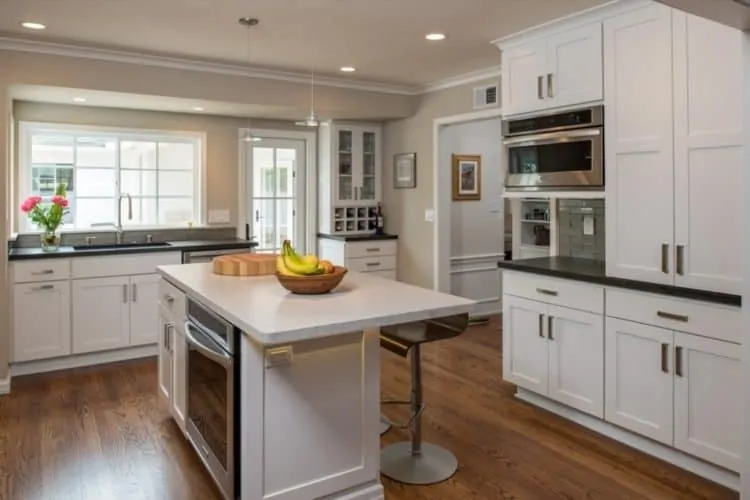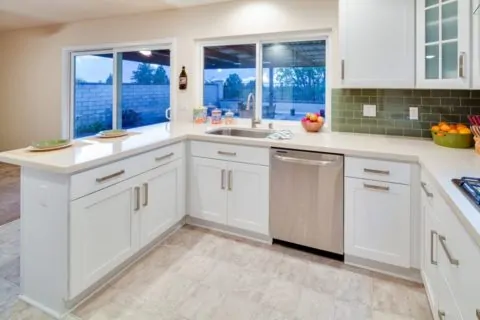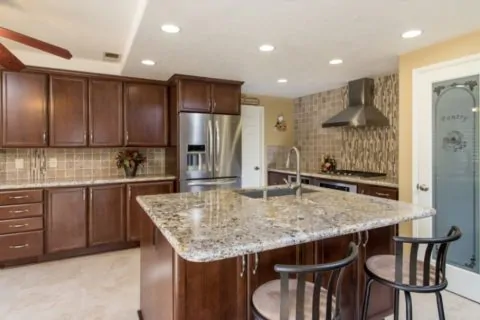
- By Remodel Works
- In Countertops
Silestone vs Granite – Explaining The Differences
As you may have discovered, when it comes to materials for countertops, there’s no short supply of options. Two of the most popular countertop options that have arisen over the years are silestone and granite. But what are the differences between the two? And which one should you choose for your home? In this article, we will be diving into the differences between Silestone vs. granite.
Structural Differences
The first material, Silestone, a combination of natural quartz and other raw materials, is extremely hard and resilient. Silestone offers the beauty of natural stone in a wide range of colors and varying textures. Just like natural stone countertop materials, Silestone is great for both kitchens and bathrooms because it’s non-porous which makes it resistant to staining. The non-porous structure also makes this an extremely sanitary material that won’t absorb liquids or external influencers over time.
The other material, granite, is a hard and sturdy natural stone material that is naturally resistant to heat. When properly sealed, granite countertops are resistant to stains from acid, oil, and food. Due to their durability as a solid surface, granite countertop cleaning and maintenance can be a breeze. Granite also offers endless modern color options and unique slabs since every slab of granite is different from the next.
Required Maintenance

With any countertop material, one of the most important considerations for the material you choose is the amount of maintenance required. Especially for areas with high potential for dirt and grime, like kitchen and bathroom countertops, the amount of ongoing maintenance you’re going to have to put in is important.
Silestone may be a better choice for those looking to do little to no maintenance. Since it is made of quartz, silestone is naturally non-porous, which makes it resistant to spills and staining caused by messy kitchen and bathroom items, like food, wine, or even makeup. For more tips on cleaning and maintaining Silestone countertops, check out our blog post.
Granite, on the other hand, is a porous stone, which makes it more susceptible to not only stains, but also bacteria and germs. For maintenance purposes, granite needs to be sealed at least once a year to keep it protected, and it will require more general upkeep to keep countertops sanitary and safe.
Resilience
Both Silestone and granite are incredibly strong materials, but when it gets down to the nitty-gritty, Silestone is a stronger material, but not by much. Granite is slightly weaker only because since it contains crystalline material, which allows for fissures and small spaces.
Because of the resilience of both of these materials, they both make for excellent investments in your home’s value. Whether you plan to sell your home anytime in the near future or not, using granite or Silestone for the kitchen countertops will increase any home’s resale value significantly.
Aesthetic Appeal
Both granite and Silestone offer their advantages when it comes to look and feel. With Silestone and other quartz materials, “small amounts of glass or metallic flecks are added to create variety, resulting in beautiful countertops” (SilestoneUSA.com). Silestone is also a very beautiful material, and offers a wide variety of color options for your selection – every color from natural tones such as whites, blacks and browns to other varieties such as golds or blues.
Granite countertops are some of the most popular out there. Because it is natural stone, granite doesn’t provide as wide of a range of color options and each piece is different, therefore, often times kitchens need to be planned around the slab that is chosen. While this will make your kitchen or bathroom truly unique, if you choose granite countertops, you should plan to be extra cautious with your design since no two granite slabs are identical. And if more than a single slab is needed, make sure all slabs are from the same quarry batch so colors and textures will match.
Both Silestone and granite are great high-end options for building in your home, but they each have their own sets of pros and cons. Silestone offers slightly more durability and less required maintenance, but granite has universal appeal and will make your home truly unique. Either way – you can’t go wrong when comparing silestone vs granite!











